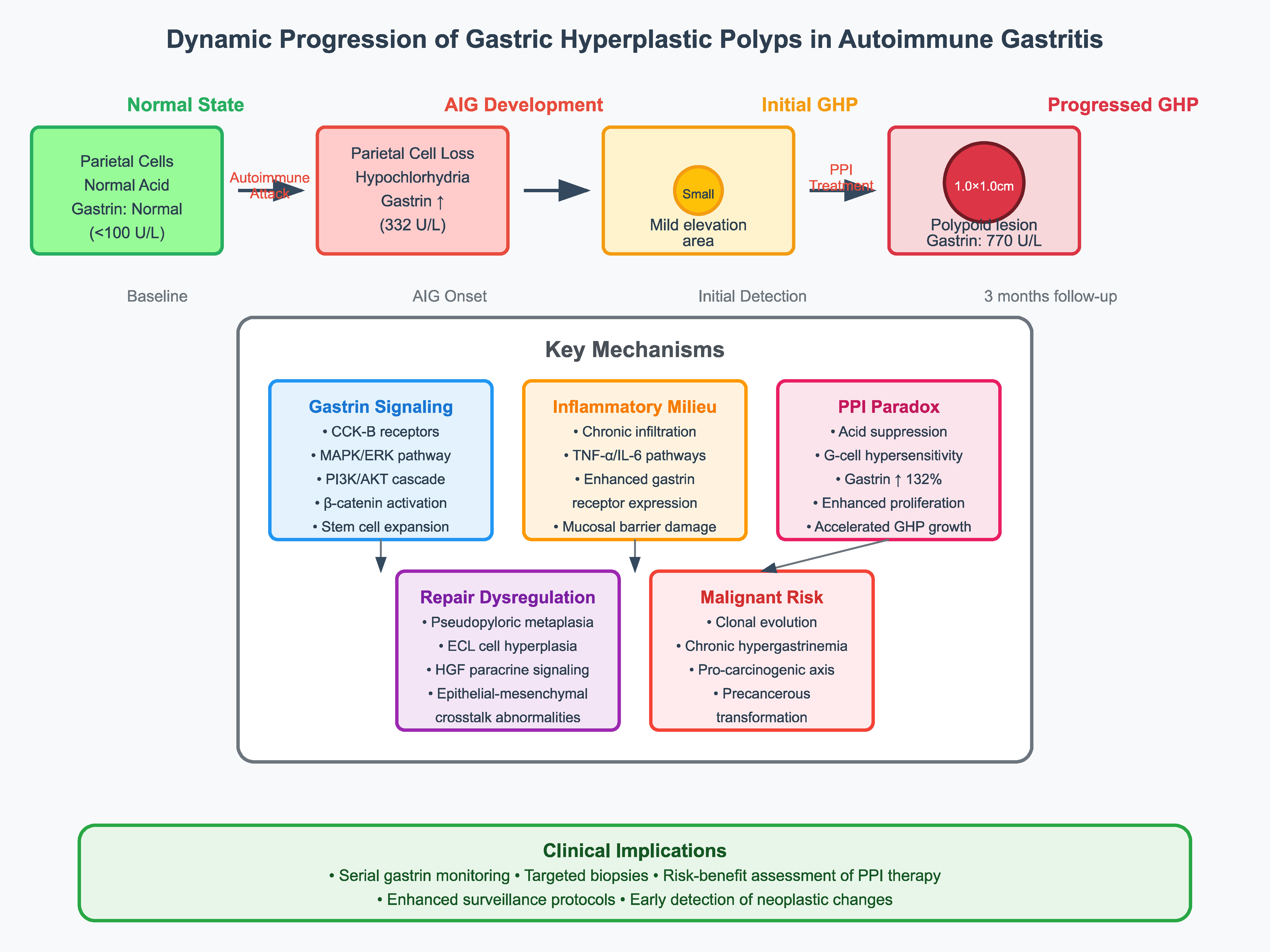Dynamic Evolution of Hyperplastic Polyps in the Setting of Autoimmune Gastritis: An In-Depth Interpretation of Gastrin-Driven Patho-mechanisms in a Case
DOI:
https://doi.org/10.71321/19f3bp17Keywords:
autoimmune gastritis, gastric hyperplastic polyp, proton-pump inhibitorAbstract
Through longitudinal clinical follow-up of a 75-year-old male with autoimmune gastritis (AIG) complicated by gastric hyperplastic polyps (GHPs), this study systematically investigated the critical regulatory role of gastrin signaling networks in gastric mucosal remodeling. The case demonstrated that within the established pathological cascade of AIG (from parietal cell destruction to gastric acid deficiency and hypergastrinemia), GHPs exhibited short-term volumetric growth. This observation challenges traditional views about the indolent nature of hyperplastic polyps. Our findings highlight the dual role of proton-pump inhibitor (PPI) therapy in AIG management while alleviating mucosal inflammation, it paradoxically induces G-cell hypersensitivity that elevates gastrin levels beyond biological thresholds (332 increasing to 770 U/L), creating a critical driver for GHP progression. This case redefines clinical management paradigms for AIG complications and offers translational insights for gastrointestinal tumor surveillance.
References
[1] Toh B H. Diagnosis and classification of autoimmune gastritis[J]. Autoimmunity reviews, 2014, 13(4-5): 459-462. doi: http://doi.org/10.1016/j.autrev.2014.01.048.
[2] Neumann W L, Coss E, Rugge M, et al. Autoimmune atrophic gastritis—pathogenesis, pathology and management[J]. Nature reviews Gastroenterology & hepatology, 2013, 10(9): 529-541. doi: http://doi.org/10.1038/nrgastro.2013.101.
[3] Carmack S W, Genta R M, Schuler C M, et al. The current spectrum of gastric polyps: a 1-year national study of over 120,000 patients[J]. Official journal of the American College of Gastroenterology| ACG, 2009, 104(6): 1524-1532. doi: http://doi.org/10.1038/ajg.2009.139.
[4] Dirschmid K, Platz-Baudin C, Stolte M. Why is the hyperplastic polyp a marker for the precancerous condition of the gastric mucosa?[J]. Virchows Archiv, 2006, 448: 80-84. doi: http://doi.org/10.1007/s00428-005-0068-2.
[5] Dockray G, Dimaline R, Varro A. Gastrin: old hormone, new functions[J]. Pflügers Archiv, 2005, 449: 344-355. doi: http://doi.org/10.1007/s00424-004-1347-5.
[6] Torbenson M, Abraham S C, Boitnott J, et al. Autoimmune gastritis: distinct histological and immunohistochemical findings before complete loss of oxyntic glands[J]. Modern pathology, 2002, 15(2): 102-109. doi: http://doi.org/10.1038/modpathol.3880499.
[7] Vannella L, Lahner E, Osborn J, et al. Risk factors for progression to gastric neoplastic lesions in patients with atrophic gastritis[J]. Alimentary pharmacology & therapeutics, 2010, 31(9): 1042-1050. doi: http://doi.org/10.1111/j.1365-2036.2010.04268.x.
[8] Park D Y, Lauwers G Y. Gastric polyps: classification and management[J]. Archives of pathology & laboratory medicine, 2008, 132(4): 633-640. doi: http://doi.org/10.5858/2008-132-633-GPCAM.
[9] Shah S C, Piazuelo M B, Kuipers E J, et al. AGA clinical practice update on the diagnosis and management of atrophic gastritis: expert review[J]. Gastroenterology, 2021, 161(4): 1325-1332. e7. doi: http://doi.org/10.1053/j.gastro.2021.06.078.
[10] Kanayama M, Takahara T, Yata Y, et al. Hepatocyte growth factor promotes colonic epithelial regeneration via Akt signaling[J]. American Journal of Physiology-Gastrointestinal and Liver Physiology, 2007, 293(1): G230-G239. doi: http://doi.org/10.1152/ajpgi.00068.2007.
[11] Lundell L, Vieth M, Gibson F, et al. Systematic review: the effects of long‐term proton pump inhibitor use on serum gastrin levels and gastric histology[J]. Alimentary pharmacology & therapeutics, 2015, 42(6): 649-663. doi: http://doi.org/10.1111/apt.13324.
[12] Toh BH. Pathophysiology of autoimmune gastritis. Semin Immunopathol. 2014;36(5):551-562. doi: http://doi.org/10.1038/s41572-020-0187-8.

Type
Published
Data Availability Statement
All data needed to evaluate the conclusions in the paper are present in the paper or the Supplementary Materials. Additional data related to this paper may be requested from the authors.
Issue
Section
License
Copyright (c) 2025 Life Conflux

This work is licensed under a Creative Commons Attribution 4.0 International License.







